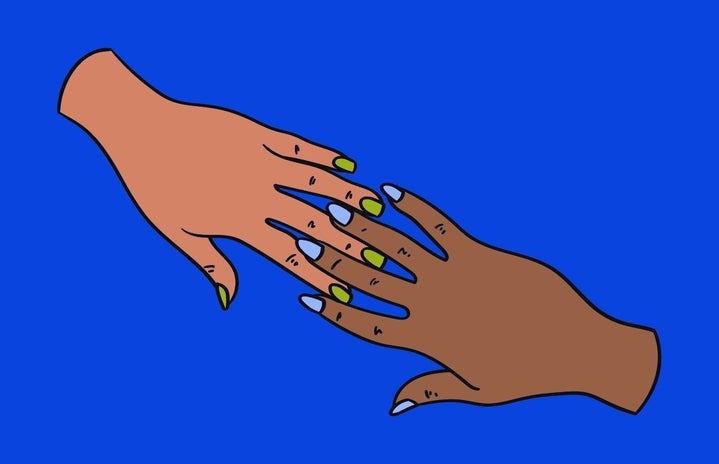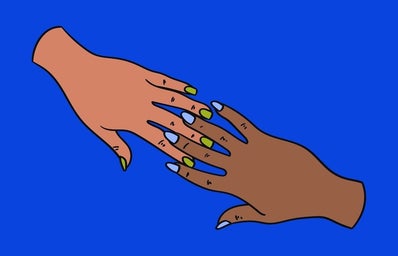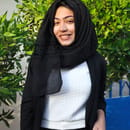Vera Mindy Chokalingam, aka The Office’s Kelly Kapoor, aka star of The Mindy Project, aka Mindy Kaling, birthed the hit Netflix series, Never Have I Ever earlier this summer. Being an avid admirer of Kaling’s work, I decided to take a break from COVID-19 stress and binge the entire first season in one week. I didn’t think that a storyline of a young Indian American teenager navigating through high school drama, white boys, and the loss of a parent would be something that I would relate to. Growing up I never knew what representation was nor how profound its effects could be, and yet watching this show as a grown 22-year-old woman, I found my inner 16-year-old self feel something foreign: understood and accepted.
I grew up in a Pakistani household and lived in Qatar until I moved to Toronto to pursue a university education. You could say I didn’t exactly have the traditional upbringing that most desi kids have to live away from their birth home – my parents gave away their savings to ensure that my sisters and I were able to get an education enriched with various experiences. I grew up with friends from all over the world who helped shape my own view on how much inclusivity matters. Yet, those same unique experiences left me feeling lost and alone. You see, the thing about being “different”, about not being a “proper” Pakistani, about not fitting the mould of what a Muslim woman “is meant to be” is that you often find yourself questioning the validity of your own experiences. It’s hard to find comfort in knowing that there are others like you when you don’t see them anywhere in the world that you live in.
Watching T.V. shows and movies had always been an escape from reality, a delve into what could be, but it was just that: a fantasy. I never thought too deeply about the purpose of art and how it was meant to make you reflect on your own inner self. That was before I watched Never Have I Ever.
*Warning: if you have not watched the series before reading at this point and onwards, go watch it first because spoilers are never fun!*
The tale of a first-generation Indian teenager, Devi Vishwakumar (played by Maitreyi Ramakrishnan), follows quite a non-conventional coming-of-age narrative. We come along on her journey as she navigates through feelings of wanting to be accepted by her white peers, her boy drama, and the trauma that she faces in suddenly losing her dad to a fatal heart attack. At first, it seems like a pretty normal show filled with references that I grew up with about intrusive aunties sticking their noses where they don’t belong, learning how to wear traditional ethnic attire for the first time (or being forced to rather lol), attending religious celebrations, and being “taught” how to act as a brown woman who is now entering adulthood.
But then, I looked over at my best friend, sitting next to me, with tears slipping down her cheek and a smile on her face. She smiles a lot, so at first glance, I didn’t realize why this one was any different. She grew up in a Tamil family and also had experienced a range of cultures around her, and in the 20 years that she had been alive, she had never seen herself so clearly represented in a show. Every time Devi’s mom would scold her in Tamil or when they would go attend a puja, or when Devi was experiencing emotions for the first time as a teenager and didn’t know how to talk to anyone around her about them, I would see that smile pop up on my friend’s face. As two women who had outgrown that stage in their lives, we sat there, in tears, watching our inner teenage-selves resurface and feel connected to something that was bigger than the individual struggles we had faced. That is the real and understated power that accurate, hopeful, and fair representation holds.
Kaling created the show wanting to somewhat represent the experiences that she had growing up as an American-Indian teenager. This is an intersectionality that is often neglected in mainstream movies and shows, yet one that is a reality for so many South Asian youth that it cannot be ignored. Oftentimes when a character of colour is added to a show the tokenism is so bluntly apparent that it almost seems comical. The Muslim girl is always oppressed until she takes her hijab off, the brown boy is a mathlete and has pressure from his parents to be a doctor (okay, partially true), and let’s not forget the classic whitewashed trope of South Asian culture being a source of fascinating exoticism. I was impressed to see that the representation was … wait for it … actually somewhat representative of the experiences of desi kids. Kaling made it a point to encourage young Indian-American writers to join the production team and be a part of the process, which is why the show actually seems like it is catered towards a younger demographic. She did a social media call-out to create a more accessible way for desi female actors to audition for the main role. It’s no surprise that this was a show that was a popular hit amongst young South Asians.
Nevertheless, Kaling has received backlash against the show from desi communities as well. The main criticism has been about how she inaccurately represented how teenagers navigate their cultural identities. In showing Devi as a character who repeatedly rejects, distances herself from Indian culture, and feels embarrassed of it at times, people have said that it projects to the rest of the world that we, as desi people, are as uncomfortable with our culture as those who view it from the outside. I agree, but that is the whole point that critics have missed. Growing up, I used to make my mom, a person who moved away from her home and from the people she loved to start from scratch, change out of Pakistani clothing when we went out. I refused to speak to her in Urdu in public spaces. I made her be the person that I wanted her to be so that I would not have to belong to a culture that people around me deemed as “different.” I didn’t want to be an outcast. Every time Devi rejected her culture I remembered how I abandoned my own. That feeling of insecurity surrounding your desi identity is a part of a larger experience that all first-generation South Asian youth experience in today’s world.
I’m still trying to figure out where my culture fits into my life and rewiring my mind into understanding that being “different” is a good thing, as it means I have a lot more to offer. But when mainstream culture neglects to include people like you in the narrative it’s hard to try and create your own path, which is why this show and hopefully more like it to come are so important.
The reason why we get upset as a community when we don’t see ourselves in shows that are meant to represent us is because we expect them to represent ALL of us. One show alone cannot do that. We need more popular art to reflect all of those experiences so that every minority community is able to feel heard, validated, and seen. This show has paved the way for this to happen and that is why it has completely changed the way I now view representation.



